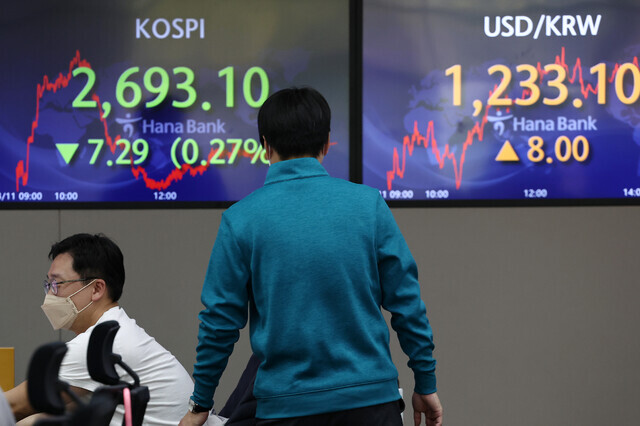hankyoreh
Links to other country sites 다른 나라 사이트 링크
Exchange, interest rates soar in S. Korea amid US consumer price fears

Exchange rates and interest rates are soaring once again amid fears over prices.
On the Seoul foreign exchange market, the won-to-US dollar exchange rate jumped by 8 won Tuesday to finish the day at 1,233.1 — signaling a steep drop in the won’s value. It marked the first time since March 16 that the exchange rate rose above 1,230 won to the dollar.
US national bond interest rates and the value of the dollar rose amid speculation that US consumer prices for March — scheduled for announcement on Tuesday — would soar higher, bolstering intensive retrenchment measures by the Federal Reserve.
Institutions in the US are predicting that the consumer inflation rate for March will reach 8.4% compared with a year earlier, surpassing the 7.9% recorded in February.
US national bond interest rates continued to rise in Asian markets on Tuesday. The US dollar index, which indicates the value of the dollar compared with the euro and five other major currencies, briefly crossed the resistance line of 100 on April 8, reaching its highest level in roughly two years.
Amid an ongoing trend of net selling of domestic stock by foreign investors, tension has been rising in the foreign exchange market after last month showed an additional steep drop in their net bond investment (purchasing, sale, and redemption at maturity).
Another variable is the fact that this week sees the payment of dividends by Samsung Electronics and many other corporations that settled accounts in December. This results in higher demand as foreign stockholders convert their won-denominated funds to dollars to transfer to their home country.
Tuesday also saw an across-the-board rise in national bond interest rates — indicating a decline in the bonds’ prices. Three-year bond interest rates were at their highest level in nine years and nine months.
On the Seoul bond market, the interest rate for treasury bonds with three-year maturity finished at 3.186% per annum, a rise of a full 0.199 percentage points. This was the highest level since July 11, 2012, when it reached 3.19%.
The interest rate for 10-year bonds was 3.305% at the end of trading, the highest level since the 3.315% recorded on June 16, 2014.
Analysts said the rise in interest rates has been influenced by jitters over a scheduled monetary policy meeting by the Monetary Policy Board on Thursday. With South Korea’s consumer inflation rate surpassing 4%, some have been predicting the board may pursue a surprise increase in the benchmark interest rate.
Interest rates for financial bonds and corporate bonds also rose with the increase in the national bond interest rates, which serve as a benchmark for market interest rates. This could end up translating into a bigger interest burden for individual families and businesses.
By Han Gwang-deok, finance correspondent
Please direct questions or comments to [english@hani.co.kr]

Editorial・opinion
![[Column] Season 2 of special prosecutor probe may be coming to Korea soon [Column] Season 2 of special prosecutor probe may be coming to Korea soon](https://flexible.img.hani.co.kr/flexible/normal/500/300/imgdb/original/2024/0426/3317141030699447.jpg) [Column] Season 2 of special prosecutor probe may be coming to Korea soon
[Column] Season 2 of special prosecutor probe may be coming to Korea soon![[Column] Park Geun-hye déjà vu in Yoon Suk-yeol [Column] Park Geun-hye déjà vu in Yoon Suk-yeol](https://flexible.img.hani.co.kr/flexible/normal/500/300/imgdb/original/2024/0424/651713945113788.jpg) [Column] Park Geun-hye déjà vu in Yoon Suk-yeol
[Column] Park Geun-hye déjà vu in Yoon Suk-yeol- [Editorial] New weight of N. Korea’s nuclear threats makes dialogue all the more urgent
- [Guest essay] The real reason Korea’s new right wants to dub Rhee a founding father
- [Column] ‘Choson’: Is it time we start referring to N. Korea in its own terms?
- [Editorial] Japan’s rewriting of history with Korea has gone too far
- [Column] The president’s questionable capacity for dialogue
- [Column] Are chaebol firms just pizza pies for families to divvy up as they please?
- [Column] Has Korea, too, crossed the Rubicon on China?
- [Correspondent’s column] In Japan’s alliance with US, echoes of its past alliances with UK
Most viewed articles
- 1‘We must say no’: Seoul defense chief on Korean, USFK involvement in hypothetical Taiwan crisis
- 2Is Japan about to snatch control of Line messenger from Korea’s Naver?
- 3The dream K-drama boyfriend stealing hearts and screens in Japan
- 4Up-and-coming Indonesian group StarBe spills what it learned during K-pop training in Seoul
- 5S. Korea “monitoring developments” after report of secret Chinese police station in Seoul
- 6Division commander ordered troops to enter raging flood waters before Marine died, survivor says
- 7[Column] ‘Choson’: Is it time we start referring to N. Korea in its own terms?
- 8[Editorial] New weight of N. Korea’s nuclear threats makes dialogue all the more urgent
- 9Will NewJeans end up collateral damage in internal feud at K-pop juggernaut Hybe?
- 10‘Weddingflation’ breaks the bank for Korean couples-to-be